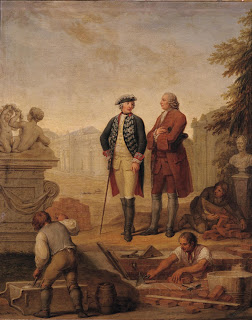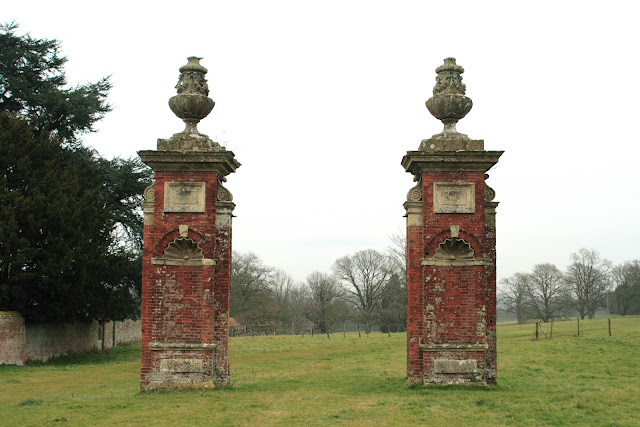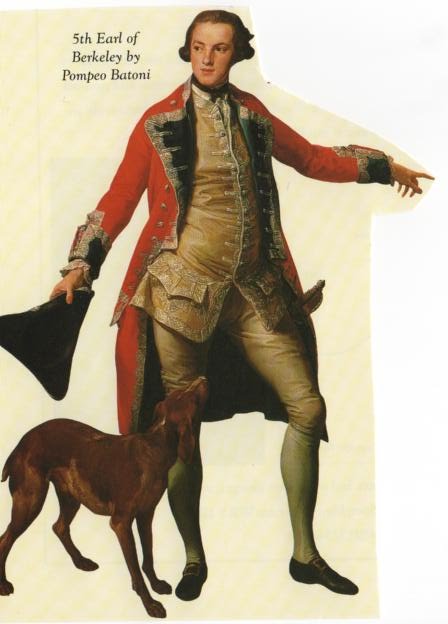Elizabeth Craven and the Marquis d'Argens
What possible connection could there be between Elizabeth Craven, the Georgian feminist writer, and the Marquis d'Argens, the French writer and philosopher? Craven was born in 1750, and d'Argens died in 1771, and as far as is known they never met. Both were writers, both went to Constantinople and both were considered to have misbehaved extensively in the course of their lives. Both loved the theatre, and and both spent part of their lives in a German court, running the theatrical entertainments.
D'Argens worked for many years for King Frederick the Great of Prussia, holding the post of Chamberlain which made him responsible for court entertainments such as theatre and opera. He was expected to organize troupes of professional actors, singers and dancers to put on productions in King Frederick's rather grand opera houses and palaces of Sans-Souci and Charlottenburg.
Elizabeth Craven went to the far smaller court of the Margrave of Ansbach where she enjoyed herself organizing theatricals likewise, not with professional actors but with court officials and their wives acting in a theatre made out of a converted stable. The plays were all performed in French, as were those at the Prussian court. Some of the plays they put on were written or translated by herself. The Margrave of Ansbach was in fact a nephew of Frederick the Great, and proudly hung a portrait of his royal uncle in his drawing room.
So both d'Argens and Craven found themselves in a foreign court in charge of putting on French plays, and both of them had a lot of fun. D'Argens never acted, but Elizabeth Craven became rather notorious for doing so.
Frederick the Great was not easy to work for, and he ended up quarrelling with his chamberlain, but in happier days as a young monarch who had just come to the throne, he actually wrote a poem to d'Argens inviting him to come to his court. He described Sans-Souci as a paradise, with idyllic gardens where peacocks strolled on six terraces and none of the cares or stress of everyday life existed. The original poem "Epistle to the Marquis d'Argens" is rather long, but here is an excerpt. He promised him good company, good conversation, informality and liberty. As job descriptions go, it is unrivalled!
Venez a Sans-Souci, c'est la que l'on peut être
Son souverain, son roi, son véritable maître;
Ce champêtre séjour, par sa tranquillité,
Nous invite de jouir de notre liberté.
D'Argens, si vous voulez connaître
Cette solitude champêtre,
Ces lieux où votre ami composa ce discours,
Où la Parque pour moi file les plus beaux jours;
Sachez qu'au haut d'une colline
D'ou l'oeil en liberté peut s'égarer au loin,
La maison du maître domine;
D'un ouvrage fini l'on admire le soin,
La pierre sous la main habilement taillée,
En divers groupes travaillée,
Décore l'édifice et ne le charge point.
A l'aube ce palais se dore
Des premiers rayons de l'aurore,
Sur lui directement lancés:
Par six terrasses différentes,
Vous descendez six douces pentes
Pour fuir dans des bosquets de cent verts nuancés.
Sous ce branchage épais, des nymphes enfantines
Font sauter et jaillir leurs ondes argentines
Sur des marbres sculptés qui ne le cèdent pas
Aux chef-d'œuvres des Phidias.
Là le train de mes jours a la démarche unie,
Là ne régne point la folie
Des assommans et longs repas,
Que la coutume règle avec sa tyrannie :
Où l'ennui bâillant s'associe
A la profusion des modernes Midas ;
Où le rire glacé tout hautement renie
La discordante compagnie,
L'étiquette et les embarras
Une table à midi frugalement servie,
Qu'on sait assaisonner par d'utiles propos
Où les traits pétillans de la vive saillie
S'égayent quelquefois sur le compte des sots,
Y pourvoit sans excès aux besoins de la vie :
On y préfère des bons mots
La saillante plaisanterie
A la gourmande intempérie ...
Ah! d'Argens, que l'espèce humaine
Est sotte, folle, avide et vaine!
Heureux qui, retiré dans un temple à l'écart,
Voit sous ses pieds grossir et gronder les orages,
Contemple de sang-froid les écueils, les naufrages
Où les ambitieux, vains jouets du hasard,
De leurs tristes débris vont couvrir les rivages!
Heureux, cent fois heureux le mortel inconnu
Qui, d'un esprit non prévenu,
Repoussant hardiment le poison de la gloire,
De sa coupe jamais n'a bu,
De qui le goût solide est enfin revenu. [1]
King Frederick II of Prussia and the Marquis d'Argens
by Johan Christoph Frisch
D'Argens worked for many years for King Frederick the Great of Prussia, holding the post of Chamberlain which made him responsible for court entertainments such as theatre and opera. He was expected to organize troupes of professional actors, singers and dancers to put on productions in King Frederick's rather grand opera houses and palaces of Sans-Souci and Charlottenburg.
Sans-Souci Palace, Potsdam
Elizabeth Craven went to the far smaller court of the Margrave of Ansbach where she enjoyed herself organizing theatricals likewise, not with professional actors but with court officials and their wives acting in a theatre made out of a converted stable. The plays were all performed in French, as were those at the Prussian court. Some of the plays they put on were written or translated by herself. The Margrave of Ansbach was in fact a nephew of Frederick the Great, and proudly hung a portrait of his royal uncle in his drawing room.
The Margrave of Ansbach
So both d'Argens and Craven found themselves in a foreign court in charge of putting on French plays, and both of them had a lot of fun. D'Argens never acted, but Elizabeth Craven became rather notorious for doing so.
Frederick the Great was not easy to work for, and he ended up quarrelling with his chamberlain, but in happier days as a young monarch who had just come to the throne, he actually wrote a poem to d'Argens inviting him to come to his court. He described Sans-Souci as a paradise, with idyllic gardens where peacocks strolled on six terraces and none of the cares or stress of everyday life existed. The original poem "Epistle to the Marquis d'Argens" is rather long, but here is an excerpt. He promised him good company, good conversation, informality and liberty. As job descriptions go, it is unrivalled!
Venez a Sans-Souci, c'est la que l'on peut être
Son souverain, son roi, son véritable maître;
Ce champêtre séjour, par sa tranquillité,
Nous invite de jouir de notre liberté.
D'Argens, si vous voulez connaître
Cette solitude champêtre,
Ces lieux où votre ami composa ce discours,
Où la Parque pour moi file les plus beaux jours;
Sachez qu'au haut d'une colline
D'ou l'oeil en liberté peut s'égarer au loin,
La maison du maître domine;
D'un ouvrage fini l'on admire le soin,
La pierre sous la main habilement taillée,
En divers groupes travaillée,
Décore l'édifice et ne le charge point.
A l'aube ce palais se dore
Des premiers rayons de l'aurore,
Sur lui directement lancés:
Par six terrasses différentes,
Vous descendez six douces pentes
Pour fuir dans des bosquets de cent verts nuancés.
Sous ce branchage épais, des nymphes enfantines
Font sauter et jaillir leurs ondes argentines
Sur des marbres sculptés qui ne le cèdent pas
Aux chef-d'œuvres des Phidias.
Là le train de mes jours a la démarche unie,
Là ne régne point la folie
Des assommans et longs repas,
Que la coutume règle avec sa tyrannie :
Où l'ennui bâillant s'associe
A la profusion des modernes Midas ;
Où le rire glacé tout hautement renie
La discordante compagnie,
L'étiquette et les embarras
Une table à midi frugalement servie,
Qu'on sait assaisonner par d'utiles propos
Où les traits pétillans de la vive saillie
S'égayent quelquefois sur le compte des sots,
Y pourvoit sans excès aux besoins de la vie :
On y préfère des bons mots
La saillante plaisanterie
A la gourmande intempérie ...
Ah! d'Argens, que l'espèce humaine
Est sotte, folle, avide et vaine!
Heureux qui, retiré dans un temple à l'écart,
Voit sous ses pieds grossir et gronder les orages,
Contemple de sang-froid les écueils, les naufrages
Où les ambitieux, vains jouets du hasard,
De leurs tristes débris vont couvrir les rivages!
Heureux, cent fois heureux le mortel inconnu
Qui, d'un esprit non prévenu,
Repoussant hardiment le poison de la gloire,
De sa coupe jamais n'a bu,
De qui le goût solide est enfin revenu. [1]
It might have been better for Frederick if he had taken his own advice, from those latter lines, but he seems to have forgotten them as soon as they were written.






Comments
Post a Comment